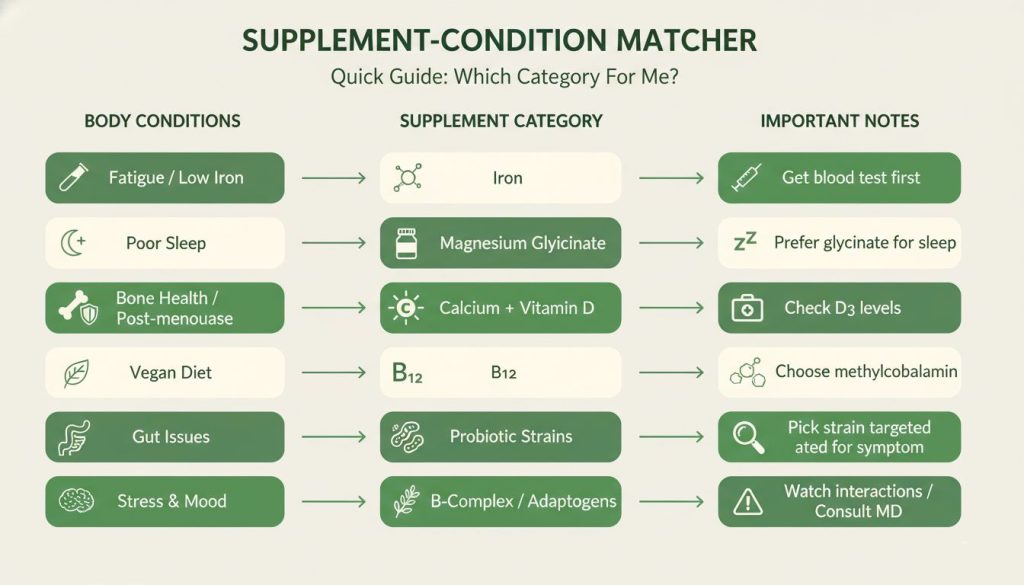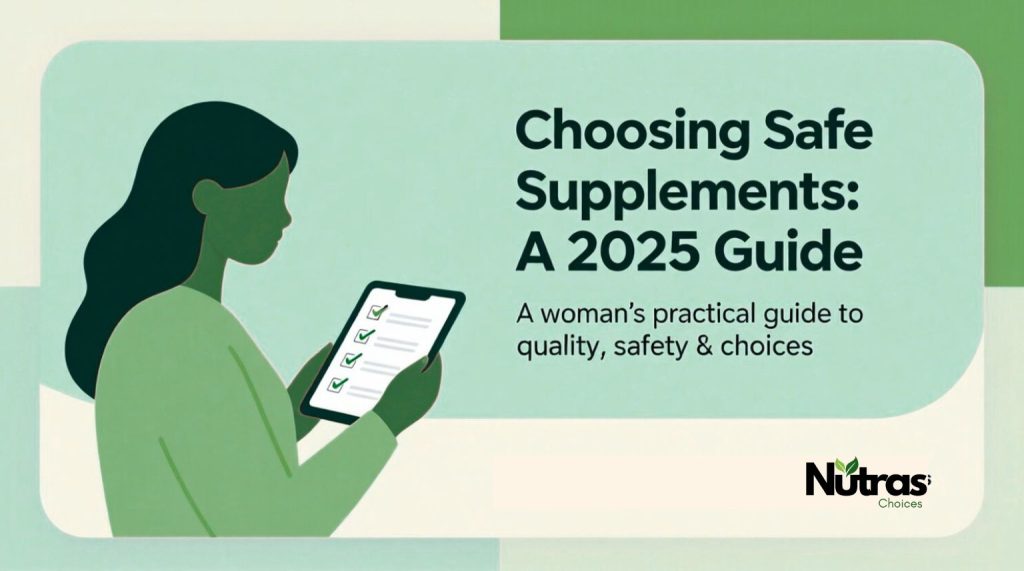This post is informational only and not medical advice. Consult a healthcare professional before starting supplements.
Walking down the supplement aisle these days feels like navigating a maze blindfolded. Rows upon rows of colorful bottles making bold promises, each claiming to be exactly what you need. I get it – I’ve been there too, standing with three different magnesium bottles in my hands, wondering which one won’t be a waste of money.
The supplement industry has exploded, especially since 2020, and frankly, not all of it has been good news for us as consumers. With minimal FDA oversight and marketing claims that would make a used car salesman blush, knowing how to choose safe supplements has become a crucial life skill.
But here’s the thing – when chosen wisely, the right supplements can genuinely support your health goals. The key is learning to choose safe supplements with confidence — becoming a smart, informed consumer who knows what to look for and what red flags to avoid.
Start with food first: when supplements are needed
Let’s get one thing straight from the start: supplements are meant to supplement, not replace, a balanced diet. I know that sounds obvious, but you’d be surprised how many people treat their daily multivitamin like a get-out-of-jail-free card for poor eating habits.
Your body absorbs nutrients from whole foods far more efficiently than from pills. That spinach salad isn’t just giving you iron – it’s providing folate, vitamin K, and dozens of other compounds that work together in ways we’re still discovering.
That said, there are legitimate situations where supplements make sense:
• Nutrient gaps that are hard to fill with food alone (like vitamin D in winter months)
• Increased needs during specific life stages (pregnancy, breastfeeding, menopause)
• Dietary restrictions (vegans often need B12, those avoiding dairy might need calcium)
• Diagnosed deficiencies confirmed through blood tests
• Certain health conditions that affect nutrient absorption
The key is identifying your actual needs rather than taking supplements “just in case.” A recent study from the NIH Office of Dietary Supplements found that many Americans are getting adequate nutrition from food but may have specific gaps that targeted supplementation can address.
Match supplements to body conditions – quick guide
Rather than playing supplement roulette, here’s a practical guide for matching common concerns with supplement categories that are commonly recommended:
Low Energy/Fatigue → Iron (but get tested first – too much iron can be harmful)
Poor Sleep Quality → Magnesium glycinate (gentler on the stomach than other forms)
Bone Health/Post-menopause → Calcium + Vitamin D3 (work better together)
Vegan/Plant-based Diet → B12, potentially iron and zinc
Digestive Issues → Targeted probiotics (specific strains for specific symptoms)
Stress & Mood Support → B-complex vitamins, magnesium, adaptogenic herbs
Immune Support → Vitamin D, zinc, vitamin C (especially during cold season)
Remember, these are starting points for research and discussion with your healthcare provider, not medical prescriptions. What works for your friend might not be right for your body chemistry.
For more detailed guidance on sleep support, check out our Sleep & Supplements guide.
How to evaluate supplement safety and quality
This is where things get real. The supplement industry operates under very different rules than prescription medications. The FDA doesn’t pre-approve supplements for safety or effectiveness – they only step in after problems are reported.
That means you need to become your own quality control inspector. Here’s what to look for:
Third-party testing certifications are your best friend. Look for seals from USP (United States Pharmacopeia), NSF International, or ConsumerLab. These organizations actually test products to verify they contain what the label claims and check for contaminants.
Clear ingredient amounts should be listed for every active ingredient. Avoid “proprietary blends” that hide behind vague terms like “immune support blend 500mg” without telling you how much of each ingredient you’re actually getting.
Expiration dates and proper storage instructions might seem basic, but they matter. Vitamins lose potency over time, and some (like probiotics) need specific storage conditions to remain effective.
Manufacturer transparency is crucial. Reputable companies provide contact information, batch numbers, and are willing to share their testing results. If you can’t easily find out who made your supplement or where, that’s a red flag.
Watch out for these warning signs:
• Claims that sound too good to be true (“melts fat overnight!”)
• Products marketed as “natural alternatives” to prescription drugs
• Supplements sold primarily through social media or MLM schemes
• Prices that seem suspiciously low compared to similar products
According to Harvard Health, the most important safety step is choosing products from established manufacturers who follow good manufacturing practices.

Dosage & interactions: rules to follow
Here’s where supplement safety gets serious. Unlike water-soluble vitamins (like vitamin C) that your body can easily flush out, fat-soluble vitamins (A, D, E, and K) can build up to toxic levels if you take too much.
The fat-soluble vitamin rule: These vitamins are stored in your body fat and liver, so taking mega-doses can actually harm you. Vitamin A toxicity can cause liver damage, while too much vitamin D can lead to kidney problems.
Medication interactions are more common than most people realize. Some examples that might surprise you:
• Fish oil supplements can increase bleeding risk if you’re on blood thinners
• Calcium can interfere with thyroid medication absorption
• St. John’s Wort can make birth control pills less effective
• Iron supplements can block the absorption of certain antibiotics
Blood tests before high-dose supplementation aren’t just a good idea – they’re essential. You can’t know if you need iron without knowing your current levels, and taking iron when you don’t need it can cause serious health problems.
Always tell your healthcare provider about every supplement you’re taking, even if it seems “natural” or harmless. Keep a list on your phone – you’ll be glad you did.
When to see your clinician before starting a supplement:
- You’re taking prescription medications
- You have a chronic health condition
- You’re pregnant, trying to conceive, or breastfeeding
- You want to take high doses of any vitamin or mineral
- You’re experiencing unexplained symptoms you hope supplements will fix
Choosing by life stage & special situations
Your supplement needs aren’t static – they change as your life changes. Here’s what to consider during different phases:
Pregnancy & Planning to Conceive
Folic acid is non-negotiable if you’re trying to get pregnant or already are. The Office on Women’s Health recommends starting folic acid at least one month before conception to prevent neural tube defects.
Look for prenatal vitamins that contain iron, but be aware they might cause constipation or nausea. Taking them with food or switching to a different form of iron can help.
Breastfeeding
Your nutrient needs remain elevated while breastfeeding. Continue your prenatal vitamin and pay special attention to vitamin D – both you and your baby need adequate levels.
Contraception & Hormonal Medications
Birth control pills can affect how your body processes certain nutrients. Some women on hormonal contraception have lower levels of B vitamins, magnesium, and zinc. However, don’t start supplementing without discussing it with your healthcare provider first.
Perimenopause & Menopause
Estrogen decline affects bone health, making calcium and vitamin D more important. Some women find magnesium helpful for sleep disruptions and mood changes, though individual responses vary significantly.
Our Women’s Multivitamins guide covers age-specific formulations in more detail.
Vegetarian & Vegan Diets
B12 is essential – there’s no debate here. Plant-based diets simply don’t provide adequate B12, and deficiency can cause serious neurological problems.
Iron from plant sources isn’t absorbed as well as iron from meat, so vegetarians and vegans should have their iron levels checked regularly.
Chronic Conditions
If you have thyroid disease, autoimmune conditions, diabetes, or other chronic health issues, your supplement needs may be very different from general recommendations. Work closely with your healthcare team to develop a plan that won’t interfere with your medications or condition management.
Practical shopping checklist
Here’s your printable checklist to take shopping or use when ordering online:
• Third-party testing seal (USP, NSF, or ConsumerLab)
• Complete ingredient list with specific amounts (no proprietary blends)
• Clear expiration date and proper storage instructions
• Manufacturer contact information and batch numbers
• Realistic claims (avoid “miracle cure” language)
• Appropriate dosage for your age and health status
• Compatible with your medications (when in doubt, ask your pharmacist)
Download our one-page Supplement Safety Checklist for easy reference while shopping.
When shopping, EatingWell’s dietitian recommendations emphasize looking for supplements that have been tested for purity and potency by independent laboratories.
Conclusion + action steps
Choosing safe and effective supplements doesn’t have to be overwhelming once you know what to look for. The key is approaching it strategically rather than impulsively, and always keeping your individual health needs at the center of your decisions.
Your next steps are straightforward:
- Get a blood test to identify any actual nutrient deficiencies before starting new supplements
- List all your current medications and bring them to your healthcare provider to discuss potential interactions
- Research third-party tested brands in your price range and read reviews from verified purchasers
Remember, supplements are tools to support your health, not magic bullets. The most expensive supplement in the world won’t make up for poor sleep, chronic stress, or a diet full of processed foods.
For specific guidance on magnesium forms and benefits, our Magnesium Glycinate Guide provides detailed information to help you make informed choices.
Frequently Asked Questions
Q: How do I know if I actually need supplements?
A: The best way is through blood testing to identify specific deficiencies, combined with an honest assessment of your diet and lifestyle. Most people benefit from vitamin D and possibly a few targeted nutrients rather than handfuls of pills.
Q: Are expensive supplements always better quality?
A: Not necessarily. Price can reflect quality, but it can also reflect marketing costs. Focus on third-party testing certifications and transparent labeling rather than price alone when evaluating quality.
Q: Can I take supplements if I’m on prescription medications?
A: Many supplements can interact with medications, so always discuss your supplement plan with your healthcare provider or pharmacist. Keep an updated list of everything you take to share at appointments.
Q: How long should I take a supplement before expecting results?
A: This depends on the nutrient and your individual situation. Some people notice energy improvements from iron supplementation within weeks, while bone health benefits from calcium and vitamin D take months to measure.
Q: Are gummy vitamins as effective as pills?
A: Gummy vitamins can be effective, but they often contain less of the active ingredients and more sugar. They’re also more expensive per dose. If gummies help you stay consistent, they may be worth it for you.
Q: Should I take supplements with or without food?
A: Fat-soluble vitamins (A, D, E, K) absorb better with food containing some fat. Iron absorbs better on an empty stomach but may cause nausea. Water-soluble vitamins can be taken anytime, though some people prefer them with food to avoid stomach upset.
Q: What’s the difference between synthetic and natural vitamins?
A: Your body generally uses both forms effectively, though some people prefer natural sources. The most important factors are proper dosage, quality manufacturing, and third-party testing rather than whether the vitamin is synthetic or natural.

